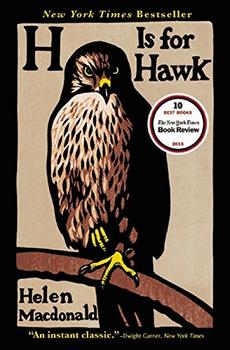Book Club Discussion Questions
In a book club? Subscribe to our Book Club Newsletter!
For supplemental discussion material see our Beyond the Book article, The Goshawk and our BookBrowse Review of H Is for Hawk.
Please be aware that this discussion guide will contain spoilers!
- When Helen was young, she remembers her father telling her that 'when you wanted to see something very badly, sometimes you had to stay still, stay in same place, remember how much you wanted to see it, and be patient.' (p8) How is being patient important to Helen throughout this book?
- Helen has lost her father and is grieving. Where did you find yourself drawn to her in sympathy or empathy? Were there times when you found her less sympathetic? If yes, when?
- "The book you are reading is my story," Helen writes. "It is not a biography of Terence Hanbury White. But White is part of my story all the same. I have to write about him because he was there." (p.38) How does T.H. White's life story help the reader understand Helen's journey?
- Helen finds her father's photographs help her feel that something of him remains, although he has gone. Does this resonate with your experience of the grieving process? What material things have become important to you after the loss of a loved one?
- After living several days with her hawk in her flat, Helen observes, "I was turning into a hawk" (p85). What do you think she means?
- How important is human friendship to Helen as she travels through her grief?
- Helen describes training a hawk in close detail. Does that engage you or are other parts of the narrative equally or more important to you?
- Helen describers herself as 'a watcher' (p68): a characteristic she says has both positive and negative aspects. How does being visible or invisible change in significance as Helen trains Mabel?
- On page 129 Helen puts forward the idea that "we carry the lives we've imagined as we carry the lives we have and sometimes a reckoning comes of all the lives we have lost." On the following page she quotes T. H. White: "Sometimes a reckoning comes of all the lives we have lost." (p130). What is White reckoning with? What about Helen? How similar are they and what connects them, beyond training goshawks?
- When Mabel catches a pheasant, Helen helps her pluck the pheasant as 'unconsciously as a mother helping a child with her dinner.' (p 184) Then, as the hawk eats, she starts to cry. Is this a turning point, and if so, why?
- Helen was eight years old when she first read T.H. White's "The Goshawk" and initially she disliked it. How do her views on White's book evolve over time? What books have you changed your mind about over the years?
- This is a story of a woman grieving in a highly unusual way. It is a deeply personal story but what makes it universal? How does it speak to your own life experience?
- Helen describes her state of mind in close detail. On the very first page she says, "I felt odd: overtired, overwrought, unpleasantly like my brain had been removed and my skull stuffed with something like microwaved aluminium foil, dinted, charred and shorting with sparks." Where did her expression of feelings resonate with you?
- "Hunting with the hawk took me to the very edge of being a human," says Helen (p 195) What prevents her from going over that edge?
- Ultimately, Helen will stop looking after Mabel. How important is letting go of the hawk to Helen's journey?
Questions adapted by BookBrowse from publisher's reading guide
Unless otherwise stated, this discussion guide is reprinted with the permission of Grove Press.
Any page references refer to a USA edition of the book, usually the trade paperback version, and may vary in other editions.
For supplemental discussion material see our Beyond the Book article, The Goshawk and our BookBrowse Review of H Is for Hawk.
